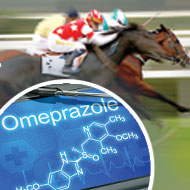
New batch tested following concerns from the racing industry
Drug company Bova UK has confirmed its long-acting injectable omeprazole has been declared free from testosterone, after low levels were found in the product last month.
Supply of the product ceased in Australia after the initial discovery by the New South Wales racing authority.
Samples tested by the British Horseracing Authority (BHA) confirmed the issue extended to the UK and the racing body recently advised against using injectible omeprazole in racehorses.
Testing by the Australian Racing Forensic Laboratory (ARFL) did not detect testosterone in the newly prepared batch of Bova’s 100mg/ml injectable omeprazole formulation.
Racing New South Wales released a statement to confirm that the product can continue to be used in racehorses following the guidance of Australian Commonwealth and State legislation.
Nick Bova, the firm’s managing director, said: “Traces of testosterone in the previous batch were less than one millionth of the internationally accepted standard for impurities. Independent experts confirmed that there could be no adverse effects on equine health or equestrian sport, however, we have taken steps to identify and completely eliminate the excipient ingredient that contained traces of testosterone.
“Bova can confirm that new batches of this product will not contain the previous trace levels of testosterone and therefore Bova are confident there will be no antidoping issues, no matter what the equestrian pursuit is.”
He added: “Many vets and horse owners now rely on long acting injectable omeprazole for horses that do not respond to oral treatment.”
Following the news, the BHA issued an updated statement on the use of the product: “The BHA are aware of the most recent results from the batch analysed in Australia. Anyone treating thoroughbreds from birth to retirement from racing should consider the latest information, alongside that from analysis of previous batches, in deciding whether to use the product.”



 The Animal and Plant Health Agency (APHA) has updated its online reporting service for dead wild birds.
The Animal and Plant Health Agency (APHA) has updated its online reporting service for dead wild birds.